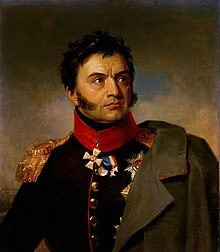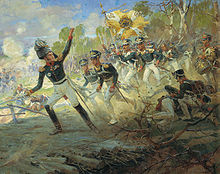Nikolai Nikolajewitsch Rajewski
Nikolai Nikolajewitsch Rajewski ( Russian: Николай Николаевич Раевский , scientific transl. Nikolaj Nikolaevič Raevskij ; * September 14th jul. / September 25th 1771 greg. In Saint Petersburg ; † September 16 jul. / September 28, 1829 greg. ) Was a Russian general of the cavalry during the Napoleonic Wars .
After deployments in the Russo-Turkish War of 1787–1792 , in the Russo-Polish War of 1792 and in the Russo-Persian War of 1796 , Tsar Paul I released him in 1796. Under Tsar Alexander I , he returned in 1801 for a few months in the rank of major general returned to the army, but retired at the end of 1801 for family reasons.
In 1807 he was reactivated for the 4th coalition war, he took part in the battles of Heilsberg and Friedland . Because of his successes during the Russo-Swedish War 1808/09 , Rajewski was promoted to lieutenant general. He was then used against the Turks in Moldova .
After Napoleon's invasion of Russia in 1812 , Rajewski commanded the 7th Infantry Corps of the 2nd Army under Bagration , which was involved in several heavy retreat skirmishes , including at Smolensk . At the Battle of Borodino , the troops led by Rajewski secured in the center at Semjenovskoye, for which he was awarded the Order of St. George 3rd degree. Rajewski took part as commander of the 3rd Russian Grenadier Corps until 1814 in the coalition wars against Napoleon , which led to the conquest of Paris ; however, he had to give up his command in the meantime because of his poor health.
After the Napoleonic Wars, also because of his health, he moved to the Crimea , where he spent a lot of time with the young Pushkin , who was friends with both Rajewski and his sons.
family
Rajewski came from an old noble family. His father Nikolai Semjonowitsch fell with the rank of major shortly before the birth of his son in the 5th Russian Turkish War ; his mother Ekaterina Samoilovna was a niece of Potemkin .
In 1794 he married Sofia Konstantinowa , a granddaughter of the polymath Lomonossow . The couple had four daughters and two sons, the sons and sons-in-law participated in the Decembrist uprising . The daughter Maria Nikolajewna Volkonskaya accompanied her husband into the Siberian exile and was there considered to be the founder of the social system.
Web links
- Rajewski's biography (Russian)
| personal data | |
|---|---|
| SURNAME | Rajewski, Nikolai Nikolajewitsch |
| ALTERNATIVE NAMES | Раевский, Николай Николаевич (Russian); Raevskij, Nikolaj Nikolaevič (scientific transliteration) |
| BRIEF DESCRIPTION | Russian general of the cavalry |
| DATE OF BIRTH | September 25, 1771 |
| PLACE OF BIRTH | St. Petersburg |
| DATE OF DEATH | September 28, 1829 |

